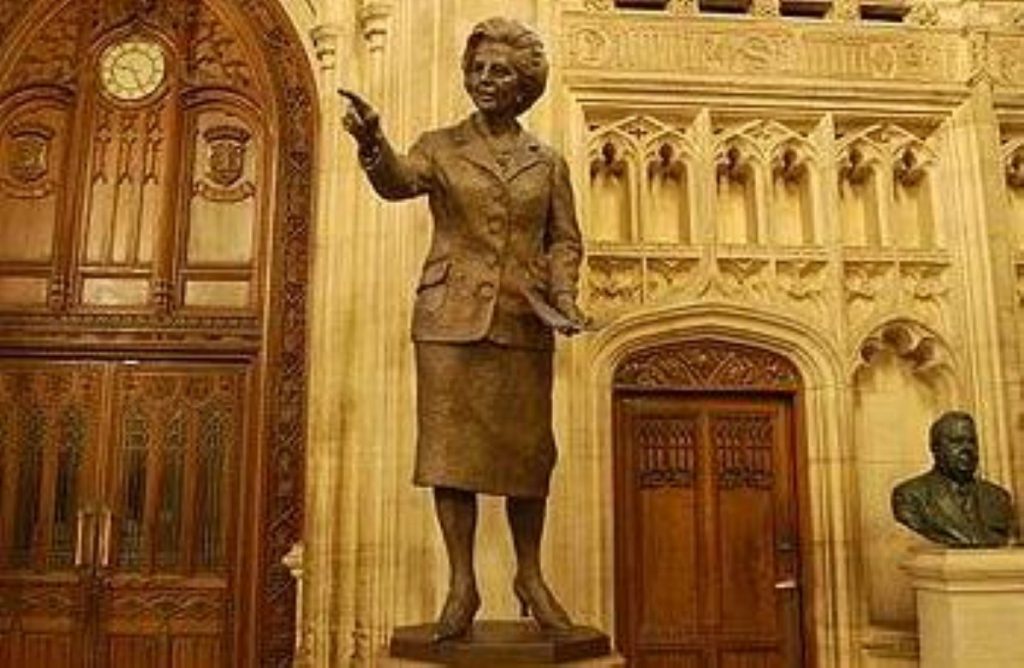Sketch: The deification of Margaret Thatcher
"She was the salvation of the nation," one Tory MP gushed during today's tribute-a-thon to Margaret Thatcher. What she did, one Labour MP said, caused "immense pain and suffering to ordinary people".
This was a day for the grizzled old veterans, the wrinklies of the Commons, to come out and deliver their verdicts on the politician who dominated their prime period in public life. Thatcher was as divisive a politician as they come. But in the coalition politics of the 21st century it sometimes feels like any kind of actual disagreement – the visceral, uncompromising kind which pervaded British society in the 1980s – is simply unacceptable. How were MPs going to cope?
The Conservatives responded with that old staple: the anecdote. From David Cameron downwards, those who knew the Iron Lady best sought to present her human side with story after story. It says something about the nature of the woman that even these little tales revealed her to be a striding titan of a woman. We were presented with visions of her agreeing with a taxi driver that there hadn't been a single "good 'un" in No 10 since she left, and with her saying she was perfectly keen on consensus – so long as the consensus was based on her convictions. Thatcher's great personality was something to remember with awe and just a little bit of disbelief. Cheryl Gillan, who joined parliament in 1992 as Thatcher left, viewed her as "a cross between my mother and headmistress – a woman to be loved and admired, but also feared".
Rarely had the speeches of the party leaders been quite so different from those of their backbench colleagues. David Cameron appeared to have a frog in his throat at exactly the moments when the news bulletins would be looking to present clips of him this evening. Ed Miliband gave Thatcher lots of admiration for having principles – and did so not especially grudgingly, either. Nick Clegg offered a balanced assessment, underlining her subtleties and rejecting the "cardboard cutout" caricature. A balanced view from the leader of a party containing very mixed views about her legacy.


All three were doing professional jobs to get through the session. Clegg got it right when he suggested the difference between her and them was that you wouldn't have doubted the conviction of her beliefs for a moment.
Miliband had asked Labour MPs to turn up as a mark of respect, and it was true that the opposition benches were fairly packed to hear him speak. They quickly thinned out after an hour or so, however, leaving a handful of MPs who wanted to have their say against Thatcher. David Winnick and Glenda Jackson were especially uncompromising in their criticisms of the woman who died just two days ago. "Sit down!" Tory MPs yelled as they lambasted her record.
Despite Winnick's worry that not criticising her would be "hypocritical", the best contributions from the opposition were those which made the point through more subtle means. The shortness of the contribution from the SNP's Angus Robertson sent a clear message of its own: 'the less said, the better'. Sir Gerald Kaufman, who was in the shadow Cabinet for ten years against Thatcher's government, preferred to mute his obviously caustic views about her time in power. Instead he recalled a time when she revealed to him she kept an article he had written in her handbag. "To be part of the contents of Margaret's handbag – what greater apotheosis could one possibly hope for."
Apotheosis, it might interest you to learn, means the glorification of a subject to divine level – its exaltation to a preeminent or transcendent position, don't you know. That just about sums up what we saw in the Commons today: Thatcher, who last week was a decrepit old lady sadly in decline, is now established in history as a shining light of division and conflict. A halo has been firmly placed above her statue in the Commons, despite the mixed efforts of Labour grizzlies to shoot it down.









